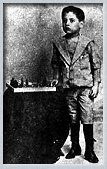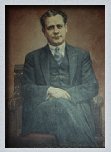Philidor
| Morphy | Tarrasch
| Lasker | Pillsbury
| Rubinstein | Niemzowitsch
| Capablanca | Reti | Alekhine
| Najdorf | Reshevsky
| Khan
. . . . . . . . . . . . . . . . . . . . . . . .
Jose Raoul Capablanca
 JOSE RAOUL CAPABLANCA Y GRAUPERA was born in 1888 and died in 1942. When
Capablanca was 4 years old, he learned the moves of chess by watching
his father play. The way we know this is because he once giggled during
a game that his father was playing with a friend. When asked why he giggled,
the young boy replied "because you moved your knight to an incorrect square."
Capablanca's father immediately started to take Jose to the Central Chess
Club of Cuba in Havana, where they had to stack books on the chair so
he could reach the chess board. When he was 11, he became Chess Champion
of Cuba, beating Juan Corzo, in 1900.
JOSE RAOUL CAPABLANCA Y GRAUPERA was born in 1888 and died in 1942. When
Capablanca was 4 years old, he learned the moves of chess by watching
his father play. The way we know this is because he once giggled during
a game that his father was playing with a friend. When asked why he giggled,
the young boy replied "because you moved your knight to an incorrect square."
Capablanca's father immediately started to take Jose to the Central Chess
Club of Cuba in Havana, where they had to stack books on the chair so
he could reach the chess board. When he was 11, he became Chess Champion
of Cuba, beating Juan Corzo, in 1900.
Capablanca refused to study chess and he never read chess books or studied chess openings. Unbelievably, he became the World Champion in spite of this. He therefore was obviously the greatest natural chess player that ever lived.
In 1905 at the age of 17 he entered the Columbia University and visited the Manhattan Chess Club and beat its champion. In 1906 the World Chess Champion, Dr. Lasker, played a simultaneous exhibition there and JosÈ won his individual lightning game against him.
 In 1908, Capablanca went on a tour of the USA for the first time and broke
all records both by results and the speed of his simultaneous play. He
played 168 games in ten consecutive sessions before losing his first game.
Altogether, his score was 703 wins, 19 draws, and 12 losses.
In 1908, Capablanca went on a tour of the USA for the first time and broke
all records both by results and the speed of his simultaneous play. He
played 168 games in ten consecutive sessions before losing his first game.
Altogether, his score was 703 wins, 19 draws, and 12 losses.
Then, in 1909, Capablanca totally freaked out the chess world. (And me, and I wasn't even born yet!) He played the American Champion Frank Marshall, and won 8-1, with 14 draws.
The San Sebastian Tournament of 1911 was historic for two reasons. (1) Only at the final hour was Jose Capablanca invited to the tournament; this was his first International Chess Tournament. (2) Nimzowitch complained that such a weak player as Capablanca should not have been invited. Capablanca not only beat Nimzowitch in the first round, but won the tournament! This made Capablanca the most serious contender to challenge Lasker's world title.
In 1913 Capablanca obtained a post in the Cuban Foreign Office with the title of "Ambassador Extraordinary Plenipotentiary General From The Government Of Cuba To The World At Large." This title was bestowed to him for the sole purpose of allowing JosÈ Raoul to travel the world and participate in chess tournaments. But sadly, after his divorce from his first wife, her family had him demoted to the post of "Commercial AttachÈ".
To illustrate his powers, he once had the mayor of Havana clear a tournament room so that no one would see him resign a game against Frank Marshall in 1913. He even once refused to pose with a beautiful film star saying, "Why should I give her publicity?"
Although Dr. Lasker won the great St. Petersburg tournament of 1914, Capablanca came second, and was therefore, one of the five initial Chess Grandmasters named by Czar Nicholas. In the eight years between 1916 to 1924 the first game that Capablanca lost was to Richard Reti at the great New York International Tournament of 1924. The loss to Reti was a game that went around the world. This eight-year feat is the greatest of the greatest. This is the immortal of the immortal.
Two interesting events occurred during the Great Moscow Tournament in 1925. In a simultaneous exhibition, Capablanca won every game except he drew against a bespectacled 12 year old boy who he told after the game, "One day you will be champion". That boy was Mikhail Botvinnik. Botvinnik not only beat Capablanca at AVRO 13 years later, but eventually did become World Champion. At one point during the tournament, Capablanca's beautiful wife entered the tournament hall and he was apparently so enamored that he left his knight en prise. He lost the knight and the game.
In 1927 the non-studying chess genius, Capablanca, lost his world championship title to the ever-studying chess genius Dr. Alekhine. With a record breaking 25 draws, Alekhine won 6-4. It is the longest world championship match in the history of chess.
The sad thing is that in those days the world champion had a say-so about who he would play against for the title. Although Capablanca was the obviously entitled challenger to the world championship, Alekhine refused to accept his challenge and instead played Bogoljubov and Euwe for the title. This was totally 100% absolutely unfair. (I am pounding the table with my fist right now!)
Capablanca lost only 36 games out of 567 in his whole career. He did not lose a single game from 1916 to 1924. Capablanca never had a chess set at home. He died while analyzing a chess game in the Manhattan Chess Club. That is probably the way he wanted to go. General Batista, President of Cuba, took personal charge of the funeral arrangements.
-----Terry Crandall
. . . . . . . . . . . . . . . . . . . . . . . .
Philidor | Morphy | Tarrasch | Lasker | Pillsbury | Rubinstein | Niemzowitsch | Capablanca | Reti | Alekhine | Najdorf | Reshevsky | Khan